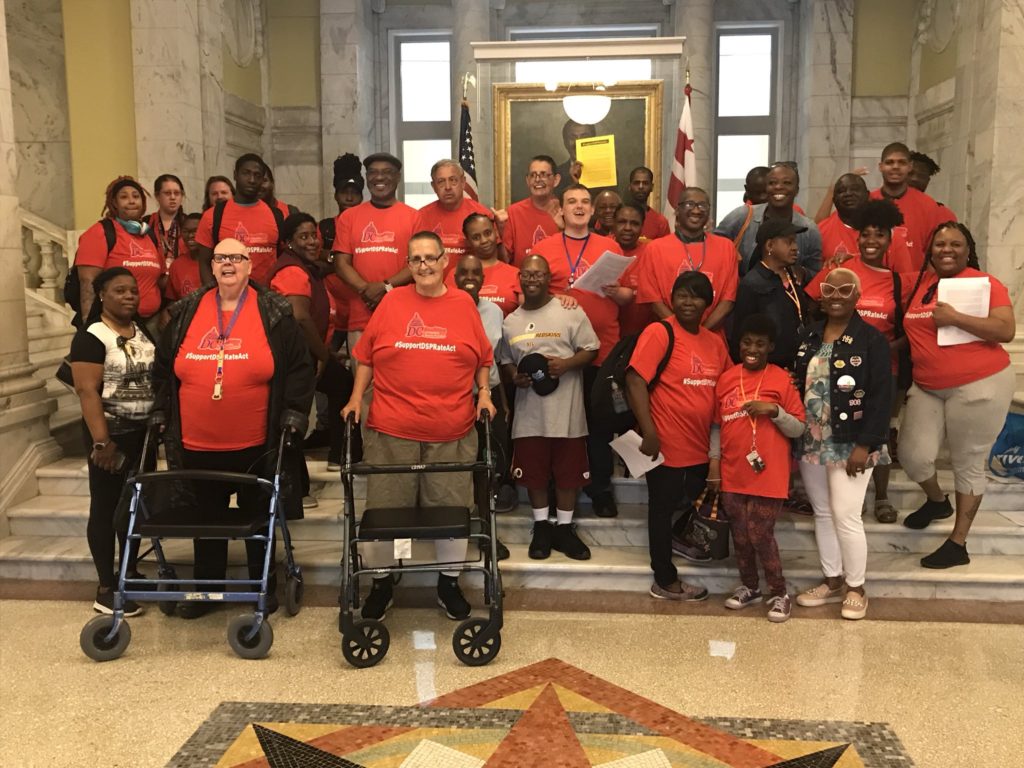The $15 per hour minimum wage in the District can lift all ships, but only if the DC Council takes action this session to support people with intellectual and developmental disabilities—and forestalls a crisis facing the fragile, embattled workforce of dedicated caregivers who support them.
One of the most important decisions on the DC Council’s plate this fall is to pass the Direct Support Professional Payment Rate Act of 2019, initiated by Councilmember Brianne Nadeau. This goal of this bill is to create a tiered wage system, based on training and experience for direct support professionals—the people who assist individuals with disabilities in doing everything from bathing and taking medications, to preparing meals and participating in activities in their community.
[Read more: This bill would increase pay for more than 4,000 professionals who assist people with disabilities]
Ésme Grewal, former vice president of government relations at the disability provider association ANCOR, illustrated the stakes clearly this summer when she spoke to a packed room of stakeholders giving testimony in support of the bill. She said “the [direct support professionals] workforce is struggling with high turnover and vacancy rates, which makes it difficult to maintain high quality of care for individuals with disabilities.”
The DC Coalition of Disability Service Providers has also been sounding the alarm: For more than two years, it has advocated for the need to adequately compensate critical workers in the disability support field.
How does this relate to the $15 per hour minimum wage? Human support services for people with disabilities must be performed by a dedicated, responsible and compassionate support staff. And in order to recruit and retain a workforce capable of providing these supports, these workers need a wage that allows them to perform this demanding job while still being able to live in the District.
When the District’s minimum wage equals the living wage in July 2020, the economic incentive that has existed for the last six years (which in 2013 allowed for wages that were 62 percent higher than the DC minimum wage) will have eroded to nothing. Presently, a worker in this field—who must complete dozens of hours of training and is entrusted with the lives of the city’s most vulnerable citizens—is funded at 50 cents per hour higher than a minimum-wage job. That is an incredible amount of responsibility for only $20 per week more than a full time-minimum wage job.
People who leave the field aren’t lacking in passion for disability support service work or trying to make a quick buck. They’re low-wage workers trying to patch together a living, sometimes holding multiple jobs just to make ends meet.
Quite simply, the role of a direct support professional is more involved than a minimum-wage job, and cannot be treated as such. The proposed legislation aids in solving this crisis with successful strategies used in neighboring Montgomery County to raise reimbursement rates and keep the direct support professional workforce ahead of a typical D.C. minimum wage worker.
All 13 city councilmembers recently stood in unison against the District’s announced closure of a 14-year contract with Georgetown University that provides medical and social services and helps people with disabilities at critical moments in their journeys. The Council sent a letter to Mayor Muriel Bowser asking to her extend the transition period, make sure it is seamless and avoid gaps in services for D.C.’s most vulnerable residents.
We, too, were concerned to learn of the end of the Georgetown contract, but the bigger picture here is that the strength of the service system—which was under legal scrutiny for 40 years during the Evans litigation—is frayed and only going to worsen if recruitment and retention remain unaddressed.
For years, we’ve seen an eroding gap between the minimum wage and living wage in D.C., mixed with an indisputable crisis in direct support professional recruitment, retention and staffing. The turnover rate this year for direct support professionals in intellectual and developmental disabilities is projected to be almost 40 percent by the end of the year, according to a survey of our members. The vacancy rate in the industry is approaching 12 percent. Those metrics are unsustainable in a field that provides lifeline services for a growing population in need—and that already faces a workforce shortage here and nationally.
With this legislation, the DC Council has a critical opportunity to implement a tiered funding system that supports our District’s most vulnerable. It should consider the impact of not taking action and effect on individuals and families that depend on consistent, highly trained staff.
It was only a couple years ago that the District emerged from 40 years of mandated court supervision for people with intellectual and developmental disabilities. Let’s not allow history to repeat itself by underfunding the wages of the workforce and undercutting the success of the District’s citizens receiving support.
Barbara Merrill is the chief executive officer at ANCOR. Ian Paregol is the executive director of D.C. Coalition of Disability Service Providers.







